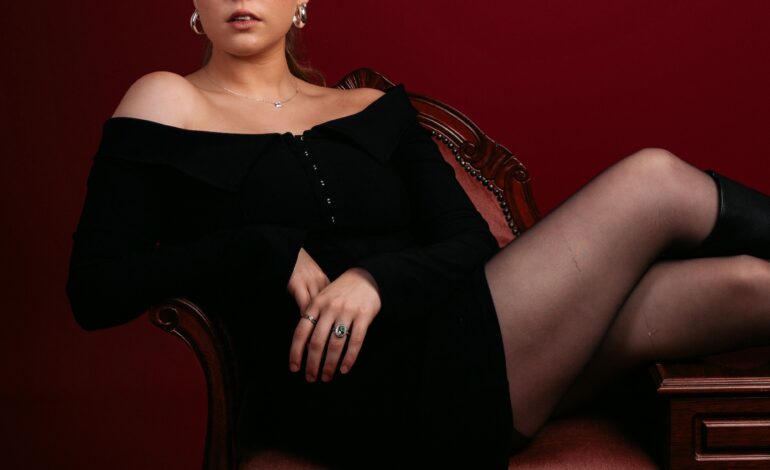BINOY, the Kenyan-born, Los Angeles-based singer-songwriter, has released his highly anticipated debut album, The Great Alone. Ultimately, The Great Alone, is a celebration of creativity without limits. BINOY has crafted a piece that encourages fans to explore, to question, and to feel free. For those looking for something original and heartfelt, BINOY is a gift that keeps on giving.
We talk to BINOY about the release and much more…
Congratulations on the release of The Great Alone! Can you tell us about the inspiration behind the album’s title and what ‘The Great Alone’ represents for you?
Thank you! I think I’ve always been intrigued by the limits of our own consciousness. Each individual story is exactly that, a unique set of experiences that no one else will ever know or understand in the same way. That can be an isolating thought to grapple with, and I’m sure is a mutual source of loneliness for us all. With The Great Alone I wanted to build a world that represented the vastness of our own solitude, from rapturous celebration to quiet despair. It brings to life my longing and lust for connection while exploring themes of emotional unavailability, all through the unfolding story of my twenties.
Your music is described as “borderless pop,” drawing from your Indian heritage and East African upbringing. How do these cultural influences shape your sound and storytelling?
Growing up I had the privilege of being exposed to lots of different music cultures from around the world. Certain sounds and instruments always caught my attention, for instance the sitar and veena, which my dad introduced to me through classical Indian music. It took a while for me to embrace my cultural identity, leave alone incorporate it into my music, but once I started to it felt like a missing piece had clicked into place. There aren’t a lot of artists with this particular cocktail of influences, so I lean into every opportunity I can now to create a distinct sound that feels authentic to my identity.
You’ve spoken about loneliness being a central theme in ‘The Great Alone’. Can you share how this theme emerged during the creative process and how it connects to your personal journey?
I have long wanted to make an album, but held myself back until I felt fully ready. When that time came, I was in the middle of a complicated situationship that had me reflecting a lot on my own emotional landscape. For my entire life I have leaned more towards introversion, and so it only felt right to make solitude the central theme of the album. I wanted to use the creative process as a tool to navigate my own loneliness and better understand myself. The result was a deep dive that led me to the important realization that my pursuit of emotional unavailability was reflective of my own. The album therefore became an opportunity to recognize and even grow out of unhealthy patterns.
The album was crafted in the order of the tracklist, almost like a narrative unfolding in real-time. What was the creative significance behind this approach, and how did it impact the final storytelling of the album?
I think making everything in order really allowed me to marinate in the aforementioned realizations and assess exactly what I wanted to say. From the start there was a narrative structure, and a lot of the song titles that I came up with early on ended up staying the same. What changed however is the lens I sought to discuss the subject matter through, as I was in a very different headspace while making each song compared to when I had the initial idea. I also had the advantage of getting to expand the album’s soundscape as we progressed knowing fully everything that had come before, enabling a degree of cohesion that I think I would have otherwise struggled with. If you listen to the project in order, it feels like a story unfolding in stages, with the final track bringing a sense of closure and resolution.
You worked closely with producers Arthur Besna and Tripped N Sat for over two years. How did that collaboration shape the album, and what was the creative process like with them?
I think collaboration is such a beautiful and important part of the creative process. I’m very lucky to be good friends with the producers I work with, which plays a huge role in the quality of product we’re able to make. I know I can take any idea, any concept, and there would be full trust in the room that we can eventually turn it into something we’re all proud of. A project of this nature also demands everyone working on it to be invested in the album as a whole, which means knowing each track and understanding the bigger picture. That again is something I’m so grateful that all my collaborators were willing to do, because it meant we were always creating within the world of The Great Alone.
Your music blends cinematic pop with evocative lyricism. Who are some of your biggest musical influences, and how have artists like Taylor Swift, Fleetwood Mac, and ABBA influenced your sound?
Definitely the names you mentioned, as well as countless more artists who I feel very inspired by. The band Lord Huron and their most recent album Long Lost was a big influence early on, even leading to the decision of transitions between each song. I think Billie Eilish has such a beautiful talent for making deeply personal lyrics catchy and memorable, so I often draw from her work as well. For the eastern influence, I referenced a lot of songs from Bollywood films as well as sitar psychedelia from the 1960s. In reality, I view any track I love as a potential reference, meaning inspiration can come from anywhere.
As a queer person of color, how do your personal experiences inform your music and your mission to create a sense of community and belonging through your work?
Growing up I always longed to see myself portrayed in popular culture, at the very least to normalize the feelings of otherness I was struggling with. That never came, and so I found myself resonating with artists that I have increasingly less in common with as an adult. This is not to say you need to share an identity with artists in order to fully appreciate their work, but rather that identity itself informs the art and story being told. My goal has therefore become to authentically reflect as much of myself as possible into the music. I think with today’s political climate especially, young people need to see otherness worn and represented with pride. Outside of policy protections, that is the most surefire way to safeguard young queer people from harmful rhetoric.
The album delves into universal themes of isolation and identity, yet it is deeply personal to your own story. How do you balance telling your own narrative while ensuring your music resonates with a broader audience?
Though my experiences are uniquely mine, the feelings they conjure are universal. Everyone understands loneliness in their own way, through the context of their lived experiences. Sure, there’s a balance to be struck between the personal and proverbial, but really I think relatability exists within any expression of emotion. That was another advantage of creating the tracklist in order, as it gave me the time to reflect on my experiences and synthesize them into the universal emotions that people would ultimately relate to.
Looking back at your musical journey—from growing up in Kenya, playing piano and saxophone, to releasing your debut album—what have been some of the most defining moments for you as an artist?
I’ll begin with the most defining moment, which was the act of starting in 2015. No progress is ever made without that first step, and I constantly reflect on my decision to pursue a career in music as courageous and radical. In 2021 I made an EP called Boyhood that I think really shifted the trajectory of my career. It was the first time I had felt secure and confident enough to speak authentically about my queer and cultural identity. The creative process built a deep sense of confidence in myself as an artist that I have taken with me since and continue to expand on.
With The Great Alone now out in the world, what do you hope listeners take away from the album, especially those who might be navigating their own feelings of solitude or self-exploration?
That loneliness is as universal as life itself. We’re all confined to our own inner workings, boundless with imagination yet limited by our singular perspective. To feel alone is human, a symptom of our consciousness, and an inevitable headspace we will frequent throughout our lives. There is beauty and pain in this realization, cause for celebration and despair. Just know that we are all here, together, alone.


